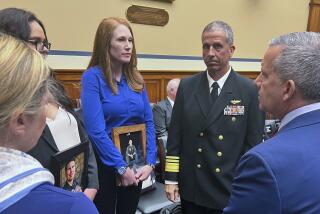Marines Begin Grounding Fleet of Failing Harrier Jets : Military: Failure of sensors made by Northrop blamed. Firm pleaded guilty to falsifying tests on system.
- Share via
The Marine Corps has begun to ground its AV-8B Harrier jets because of failures in on-board sensor systems supplied by Northrop Corp., which pleaded guilty in February to criminal charges of falsifying tests of the equipment, congressional sources said Monday.
The Marines began the grounding in April and will have grounded five planes by October, after which the aircraft will be taken out of service at an average of 1 1/2 planes per month, according to congressional sources quoting Navy documents.
The Harrier jet is a key weapon in the Persian Gulf crisis, with about 60 of the aircraft estimated to be deployed in the region. Information about whether the defects in the sensors might be affecting Marine military operations there is classified, a congressional committee source said.
The Marine Corps has just under 200 Harriers in its fleet.
A Navy official Monday confirmed that aircraft are being grounded. He said the Northrop sensor systems, which control the stability of the aircraft, are failing at a faster rate than projected by Navy requirements. No spare sensors are available to repair the aircraft, necessitating parking the $22-million Harriers as problems arise, the congressional source said.
No other company produces the “rate sensor assembly” and it is unclear how long it would take to find another maker for the part. Last year, Northrop was suspended from receiving new contracts for the sensor, among other products.
Northrop officials said Monday that they had no knowledge of the grounding.
The Navy documents are expected to be introduced today at a hearing before the House Committee on Government Operations about fraudulent testing of Harrier parts by Northrop. The hearing will be the seventh held since 1987, called by three different committees, to examine problems at Northrop.
“We simply don’t know whether the weapons will do their job,” said Rep. Christopher Shays (R-Conn.), a committee member. “We may find that some of what our soldiers depend upon will not perform up to specification. It may threaten the lives of many of our men and women in uniform.”
Reliability problems with the sensors have caused accidents, committee sources said. Details of the mishaps are unavailable and Northrop officials said they are unaware of any such accidents. A federal official corroborated the report that aircraft have had mishaps and added that the Navy has fought efforts to reveal the full extent of the safety problems associated with the sensor.
Northrop pleaded guilty to 34 counts of falsifying tests on a guidance system for an Air Force cruise missile and on the so-called “rate sensor assembly” for the Harrier. The federal indictment charged Northrop with not performing required tests and providing falsified results.
Under its Navy contract, the company was supposed to vibrate the Harrier sensor at 32 times the force of gravity, but the company’s test device was not capable of vibrating at that intensity, said William Fahey, the assistant U.S. attorney who prosecuted the company.
“They vibrated them to less than half the requirement,” Fahey said Monday.
After the government’s investigation of Northrop became public in 1987, Northrop obtained permission from the Navy to relax the vibration requirement, but it was still unable to get the sensor assemblies to pass the test, Fahey said. The company asked for a second reduction in the requirement, which the Navy agreed to in 1988, Fahey said.
Even after the second reduction, which took the requirement to 12 times the force of gravity, Northrop had to “reconfigure” the sensor so that it could pass the test, Fahey said. Neither the Navy nor Northrop undertook any program to repair or replace the earlier Harrier jets with the improperly tested and produced units, he said.
Fahey also said that federal investigators obtained preliminary reports that aircraft accidents were occurring with the defective sensors, but the Navy never produced a full record.
“The Justice Department has had difficulty obtaining a complete record of the performance history of the Harrier jets with respect to the rate sensor assemblies’ ability to perform as contractually required,” Fahey said.
A Northrop spokesman said the company has sought unsuccessfully to obtain government reports about the failure rates of the sensors. In the past, Northrop has stated that the fraudulent testing was done by a small group of employees who were fired and that the operation in Pomona, where the false testing occurred, has been closed.
Although the criminal case is closed, Fahey said the Justice Department is continuing to pursue a civil case against Northrop on the Harrier. The Pentagon has yet to conclude an administrative case that will determine the future of the Northrop subsidiary that produced the sensor.
That subsidiary, the precision products division in Norwood, Mass., is under an administrative suspension that bars it from obtaining new government contracts. A Northrop spokesman said the company is still making the rate sensor assemblies under prior contracts.
Rep. John Conyers Jr. (D-Mich.), chairman of the Government Operations panel said, “Northrop is a case study in botched Pentagon procurement.” The committee’s panel on legislation and national security will conduct the hearing today.
More to Read
Sign up for Essential California
The most important California stories and recommendations in your inbox every morning.
You may occasionally receive promotional content from the Los Angeles Times.












